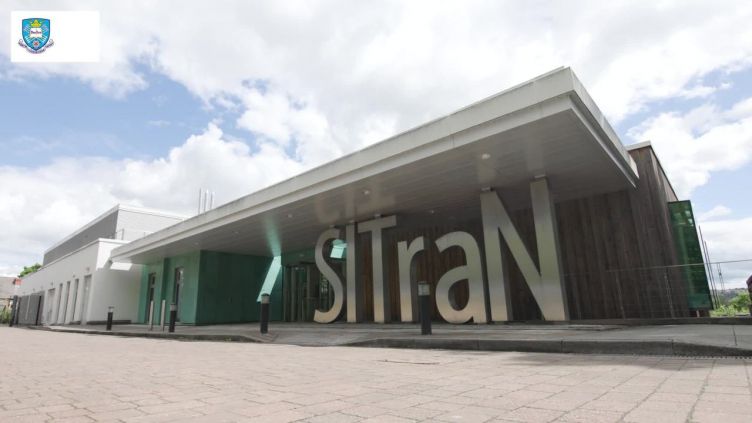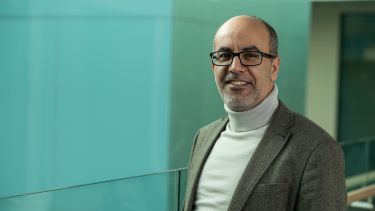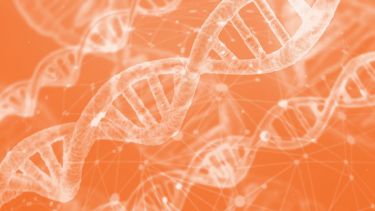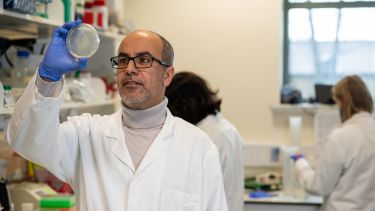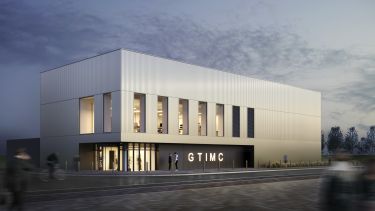What is genetic disease research?
The University of Sheffield is pioneering treatments for genetic diseases. Our research aims to uncover the mysteries of disease and develop gene therapy treatments for previously incurable conditions.
The Sheffield research that could save lives
- 1 in 25 children is affected by a genetic disorder.
- There are over 7,000 rare genetic diseases with no cure.
- More than 300 million people are living with a genetic disease worldwide.
And now staff, students, graduates and friends of the University are joining together to raise money for genetic disease research.
Sheffield's research is helping to find treatments that could cure genetic conditions. From rare genetic diseases such as COL4A1, to hearing loss and inherited forms of MND and dementia. Find out more about the appeal
Leading a gene therapy revolution
Gene therapy is emerging as a potential treatment for a number of genetic diseases, through the use of ‘viral vectors’. By removing the harmful properties of a virus, a ‘therapeutic gene’ can be introduced into a patient’s cells.
This treatment can replace or switch off a faulty gene that’s damaging tissue in the body which can alleviate or even reverse the impact of genetic diseases.
The University of Sheffield is taking on a leading role in advanced cell and gene therapy in the UK, Europe and even worldwide. Sheffield has a fantastic track record, excellent facilities and is leading the field in gene therapy. We’re also experienced in clinical trials and bringing treatments to patients."
Professor Mimoun Azzouz
Chair of Translational Neuroscience at the University of Sheffield and Director of the GTIMC
- The biology behind genetic disease
-
Genetic disease is caused by changes in a person’s DNA that seriously affects the cells in the body.
Genes play a part in nearly all health conditions. But for some, these faulty or missing genes are almost exclusively responsible for causing the condition. These are genetic diseases.
Most of these genetic diseases are life-threatening. Or have a significant impact on a person’s quality of life.
Our DNA plays a crucial role in the body. It’s the code needed for making proteins which carry out many of the functions in our body. Mutations, missing or faulty genes can seriously change the cells in our body causing a genetic disease.
Most genetic diseases, in particular rare conditions, have no cure. Yet many of the current treatments only target the symptoms. They can help enhance the quality of life of patients. But there is no efficient way to stop the progression of many of these conditions.
- Hope for rare diseases
-
A disease or condition is considered rare if it affects fewer than 1 in 2,000 people within the general population. However, 1 in 17 people will be affected by a rare disease at some point in their lives.
Because of their rarity, there has been little research to understand these conditions and develop treatments. Sheffield scientists are changing that by investigating a method of treatment that could help multiple rare genetic diseases by fixing the faulty genes themselves.
And more common diseases including inherited forms of MND, frontotemporal dementia and age-related-hearing loss are also set to benefit from advances in gene therapy.
- How Sheffield is pioneering new treatments
-
The University of Sheffield is a world-leader in gene therapy research. Our scientists and clinicians work together with experts in translational medicine, using the latest research to help patients.
Professor Azzouz has already been instrumental in developing a gene therapy treatment for babies with Spinal Muscular Atrophy (SMA) type 1. This track-record shows the tremendous potential of Sheffield research, and will hopefully change the lives of even more people with genetic diseases.
Sheffield is renowned for translational neuroscience research through the Sheffield Institute for Translational Neuroscience (SITraN) and the Neuroscience Research Institute. We are also home to the only National Institute for Health Research (NIHR) funded Biomedical Research Centre in the UK – a collaboration between the University and the Sheffield Teaching Hospitals NHS Foundation Trust, one of the UK’s largest and most successful hospitals within the UK National Health Service (NHS).
- Forging a new manufacturing heritage in Sheffield
-
The University of Sheffield’s Gene Therapy Innovation and Manufacturing Centre (GTIMC) is one of three pioneering hubs in a new network funded by LifeArc and the Medical Research Council (MRC), with support from the Biotechnology Sciences Research Council (BBSRC).
The new centre will boost investment in the region and help to regenerate the local economy. By 2027, it’s estimated that the GTIMC will have created 125 high skilled and highly remunerated jobs and added £28 million gross value added to the region.
It puts Sheffield right at the heart of world class research and innovation into Gene Therapy that will present a real opportunity for regional economic growth within the supply chain and job creation in South Yorkshire."
Dan Jarvis
Mayor of South Yorkshire
How your support will help
In order to produce the viral vectors for gene therapy we need large, specialised machines. To accelerate research towards clinical trials, we need to get our labs in the new GTIMC up and running as soon as possible.
That’s why the Sheffield community is coming together to help raise £200,000 for a Bioreactor.
This technology will enable researchers to incubate the cells needed for gene therapy at consistent environmental conditions. Having this specialist equipment will mean we can get official accreditation that proves our treatments are ‘medical grade’ and ready to be used with patients in clinical trials. The first research projects set to benefit are rare conditions and MND.
For families desperately waiting for a treatment, your help can’t come soon enough.
Having this piece of equipment at the GTIMC will help to produce treatments for up to 5 conditions a year. This will help push research from the lab to clinical trials as soon as we can. Ultimately leading to treatments for thousands of diseases.

